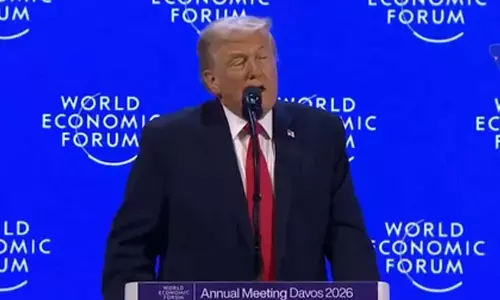Water crisis highlighting inequalities within cities, between nations: Mridula Ramesh

Mridula Ramesh, a leading clean-tech angel investor with a portfolio of over 15 startups and who is involved in multiple initiatives to build climate entrepreneurship, ran out of water at her Madurai home in 2013.
Mridula Ramesh, a leading clean-tech angel investor with a portfolio of over 15 startups and who is involved in multiple initiatives to build climate entrepreneurship, ran out of water at her Madurai home in 2013.
In trying to find out why that happened and what could be done about it, her first book, "The Climate Solution" and entry into the world of climate happened only to realise that people speaking about climate change speak almost exclusively of carbon, while the climate itself speaks in the language of water.
"For India, arguably one of the most vulnerable countries to the changing climate, water needs its share of the conversation," and her new book, "Watershed" (Hachette India), "is an effort to correct that imbalance" because "we have crossed certain climate thresholds, and need to address water to lessen the pain that Indians are feeling in this changed climate", Mridula said.
"More worrisome, the changing climate and water cycle is highlighting inequalities such as those between rich and poor within a given city and between the developed and developing world. Storms, flooding and drought affect the poor more than the rich," she added.
Moreover, looking at this through a climate justice angle, "we find that adaptation (a large part of which is managing water) is getting a far less conversation-share and lower share of financing than mitigation, even though developing countries have contributed far less to the cumulative GHG emissions that have caused this global warming. This lower priority only serves to increase existing inequalities," Mridula explained.
She also said, "As the climate heats up, it is likely that swathes of land will be submerged, water-related extremes will re-shape industry and famine will revisit the country."
Sea-level rise and stronger storms and stronger storm surges will result in parts of the country being underwater for at least some time each year in the future. Many industries came up in the belief that water is endless and cheap climate change is challenging both of those beliefs. For example, sectors like thermal power plants in dry regions may find the going far less profitable, and may need to relocate or shutdown.
"On famine, we have gone from a nation of 220 million eating largely millets to a nation of 1.3 billion eating rice and wheat. The price for this transformation has been paid largely from the groundwater reserved of the dry northwest. In 2019, a state committee had opined that Punjab may run out of groundwater in 20-25 years. What will happen if an El Nino hits after that? That's what the plausible fictional scenario in Chapter 24 tries to portray what can happen if all these come to pass in the near future," Mridula cautioned.
Considerable research has gone into the book, with the studies conducted by the Madurai-based Sundaram Climate Institute forming one of its core pillars.
"We have spoken to over 2,000 households on their waste and water realities apart from studying the communities and impact of 100 tanks. Then there was the historical research, many of which involved interviews, site visits and perusal of primary sources such as letters or writings of colonial officials. Then there was the peer-reviewed literature from archaeologists, geologists, chemists, hydrologists, climatologists, medical doctors, and historians," Mridula elaborated.
"In terms of climate and water vulnerabilities, India ranks very high because of its population, its relative financial position, the large share of rainfed farms in agriculture and its long coastline. Also important to note is that the Indian Ocean has warmed faster than the other oceans in the world, leading to more powerful storms," Mridula said.
Speaking about her experience with her net-zero-waste home and how this can be replicated at the micro and macro levels, she said: "Before we did anything we collected data, what we wasted, who, why, how. Over time, patterns emerged and we began seeing what the biggest areas of waste were -- so we brought the amount of 'generated waste' down."
"Second, we began to see how much of the 'waste' we could reuse -- that is re-imagination, how to see 'waste' as a 'resource' -- that was the killer step. We make compost and biogas, which keeps the garden healthy and the costs down. We also bring in waste from outside -- flower waste and cow dung -- to help with the compost and biogas.
"We have had our successes and failures, but what has kept us going is the focus on data, and emphasis on making any action as easy to follow as possible," Mriduala concluded.














